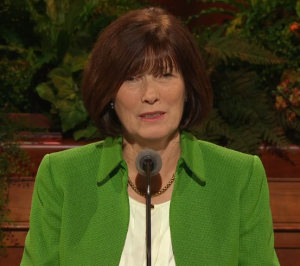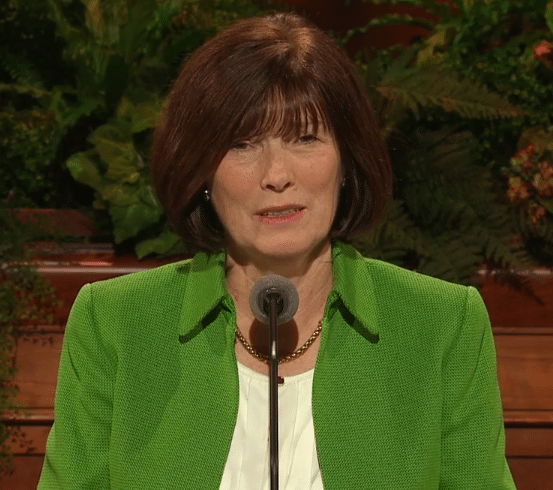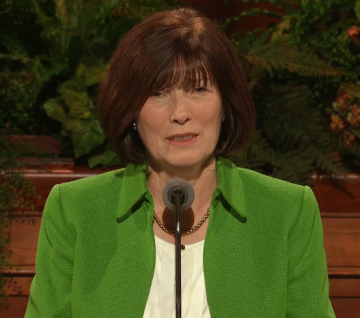 This evening Sister Linda S. Reeves, second counselor in the Relief Society general presidency, gave a talk on chastity. As I recall the chastity talks and lessons I’ve received and given, this one is very similar: there is a bit of whiplash between topics. On one hand, there are certain expectations to follow Church standards and the strident language that comes with emphasizing their importance. On the other hand, there is the atonement that covers everything, even if we don’t follow all the standards exactly. I teach YW and recently taught a lesson on dating; I know how hard it is to keep the balance there, so I want to give Sister Reeves some charity as I walk through some of the contradictions in her talk. All through her talk, “virtue” is used as a code word for chastity, though I personally feel that virtue consists of much more than not having sex outside of marriage.
This evening Sister Linda S. Reeves, second counselor in the Relief Society general presidency, gave a talk on chastity. As I recall the chastity talks and lessons I’ve received and given, this one is very similar: there is a bit of whiplash between topics. On one hand, there are certain expectations to follow Church standards and the strident language that comes with emphasizing their importance. On the other hand, there is the atonement that covers everything, even if we don’t follow all the standards exactly. I teach YW and recently taught a lesson on dating; I know how hard it is to keep the balance there, so I want to give Sister Reeves some charity as I walk through some of the contradictions in her talk. All through her talk, “virtue” is used as a code word for chastity, though I personally feel that virtue consists of much more than not having sex outside of marriage.
Upon the start of the talk, Reeves stated that keeping our bodies pure will enable us to create more bodies for God’s children. Immediately, I ached for the many women who want so much to have children, but being as pure as possible will not allow that to happen.
Reeves gave a couple of lists in her talk. The first consisted of example of activities that lead people away from being chaste such as romance novels, soap operas, connecting with past flames on social media, and pornography. She also said that the standards in the Strength of Youth pamphlet applies to everyone “regardless of age.” This attitude saddened me because it contributes to the perpetual treatment of everyone in the church like children. I recalled 1 Corinthians 13:11: “When I was a child, I spake as a child, I understood as a child, I thought as a child: but when I became a (wo)man, I put away childish things.”
Continuing after all the warning of danger (very strident too!) that might Reeves gave a small section of her talk to the atonement. I think that’s very important, but I wish there had been discussion that in the case of sexual assault or rape, you are not considered unchaste or that your virtue has been diminished.
Next, Reeves gave a list of helps: scriptures, prayer, the temple, covenants, keeping the Sabbath, following the prophet, and virtue. Additionally, she added that wearing the temple garment shows love and devotion to God. The next part is where I found the greatest contradictions in the talk.
Reeves quoted Doctrine and Covenants 82:10, “I, the Lord, am bound when ye do what I say; but when ye do not what I say, ye have no promise.” She implied that as we follow the list of helps and stay chaste, we’ll receive blessings.
Immediately after that, though, she gave an example of a woman who was doing all the right things, but still felt despair about her value to God. Reeves then stated we won’t have all the blessings in this life and that trials qualify us for eternal life and to keep the vision of all promised rewards in front of us.
I really wish blessings weren’t spoken of as rewards. I wish we spoke about chastity as a way to live our lives in alignment with our personal values so that we can accomplish our live goals and be instruments of God as opposed to “God will give you these things if you do this.”
For me, the meatiest part of this talk was thinking of the question she posed that we’d ask God in the end: “Was that all that was required?” I believe that the intent of this question was to tell us that in the end, all of the things we need to do will seem small. However, I had fun moving that sentence around in my head: Was that all required? What parts might not be “required”? What parts does the atonement cover? What parts are important that I do? Chastity is important, but I feel that we need to get away from God-as-Vending-Machine rhetoric.
Your thoughts and feelings on Sister Reeves’ talk?






5 Responses
Not to get sidetracked, but to help others from getting sidetracked on what I see as a non-issue, a quick reference to the OED (or even dictionary.com) will remind us that virtue can be defined in many ways, including as a synonym for chastity.
Thanks for this. I’m working and have to miss it.
Would a man’s response be welcome?
After years in a sexless marriage, my response to her talk can be summed up like this. My main impression from this talk is that sexuality is a minefield of sin and evil to be avoided at all costs (though, she does emphasize that sexual sin is not beyond the power of Christ’s atonement). She quotes Elder Packer about how happiness in this life and eternity depends on how we respond to sexual desires. One might get the impression that the happiest Mormons are and will be the asexual Mormons.
A few weeks ago, in your lesson plan for lesson 17 of the ETB manual, the question was asked about how to be chaste and maintain desire for our spouse’s. My response to this question might be, “do we as a Church really value keeping passion alive in our marriages?”
I realize that chastity and sexuality is too deep and nuanced to cover completely in an 11 minute talk. I also realize that navigating the sexual relationship in marriage is much more than can be covered in an 11 (or maybe even 110) minute talk. I don’t know how to do it, but I often wish that we could find a way to discuss chastity and sexuality in a way that helps singles be abstinent until marriage without contributing to Sister Brotherson’s “Good girl syndrome”.
I haven’t listened to this talk, and probably won’t, based on this post. The chastity bring the reward of fertility is too painful for those of us who are infertile. The addition of finally being blessed with fertility only after death only encourages us to wish for death. Women have a higher rate of suicidal thoughts. I’d be nice if the church didn’t encourage this.
I wish they’d also acknowledge the very real costs of chastity. Entering my 30s and still single, I deal with very real body aches and loneliness that is at times crushing. It’s a weight I physically feel with regularity and I have no idea how to handle it sometimes and it has worn me out both spiritually and physically.
It would have helped me if she’d expounded on the story of her friend who’s twice divorced and how she handles her life. Stories like that always seem to be acknowledged only in the most shallow way before moving on.